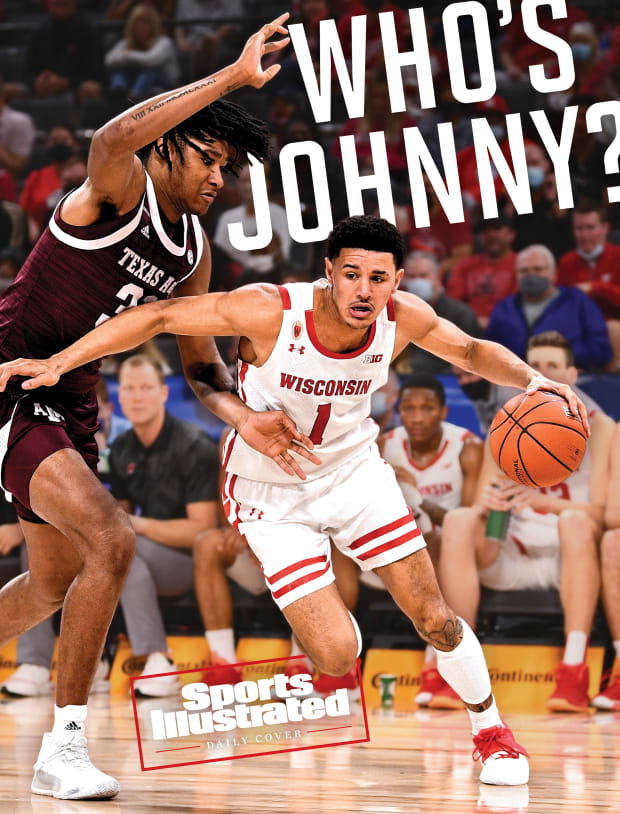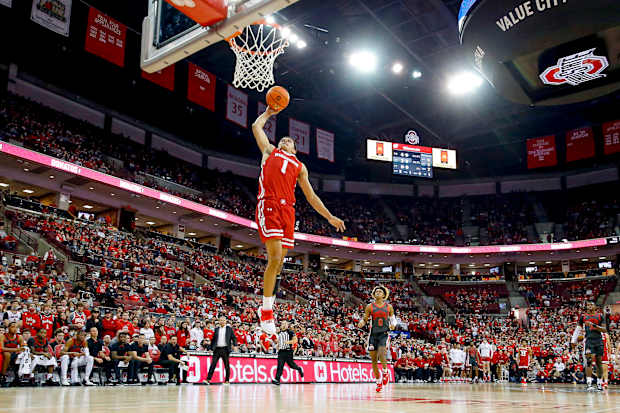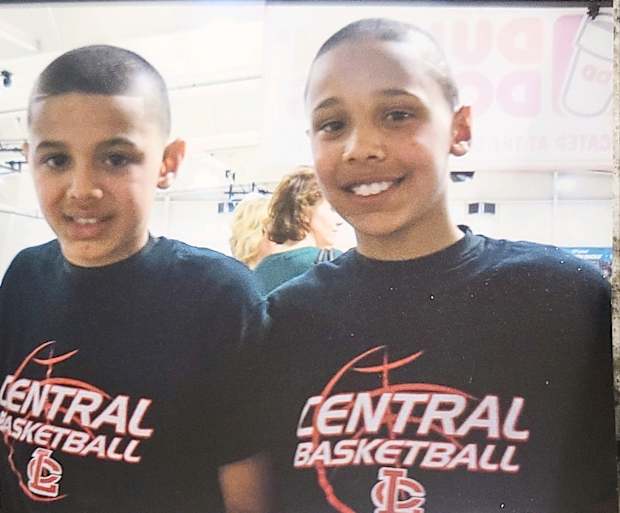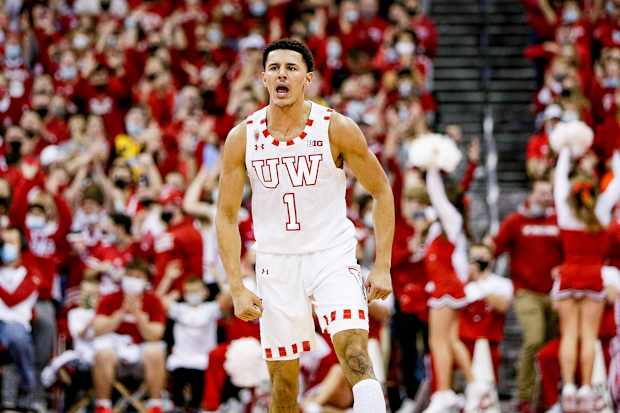Johnny Davis has something to show the officials. It’s a late January night in Evanston, Ill., Wisconsin leading Northwestern by five, emotions running high, and here’s his left thumb, drenched in blood after a foray into his upper nostril. Two plays ago, a wayward swipe struck a driving Davis across the face and drew no whistle. There’s your proof the National Player of the Year front-runner bleeds like everybody else. Davis waves his hand around for everyone to see as he stalks back to the huddle and composes himself. It’s too late to relitigate that particular moment, but the referees are kind enough to grant a timeout, so he can tidy up.
Davis has played the hits and taken his share over the past two months. He lit up the Maui Invitational in November and became men’s college basketball’s most unflinching face, scowling his way through makes and misses, mostly makes. He’s gone from national afterthought to a candidate for every major award and a projected early selection in the NBA draft. But over the past few weeks, the Big Ten has tested that inscrutable expression, battering him on drive after drive and scheming to make his life difficult. The second half against Northwestern was full of no-calls, all while Davis visibly favored his left ankle, which he sprained five days earlier back in Madison while leading a win against Ohio State but prefers not to admit is bothering him.

Brian Rothmuller/Icon Sportswire/Getty Images
Davis’s success surprises only those who don’t know him well, which, to be fair, is a lot of people. He was a three-star recruit who averaged seven points as a freshman. He wasn’t on a single award watch list before the season. Davis understands why expectations were low, and remembers all the slights. But all this was part of why he came to Wisconsin, two hours away from home in La Crosse, Wis., to play in the Big Ten. Davis came to share these moments with his twin brother, Jordan. He sought to attack the best defenses college basketball could offer. He dreamed about an NBA future and came in search of commensurate respect. Self-motivation has long been Davis’s resting state. So, when he’s pissed off, just make sure to give him the ball back.
Out of the break, still smarting and wrinkling his swollen nose, Davis shrugs off a sportsmanlike pat from Northwestern’s Chase Audige, who’s spent a sizable chunk of the past few hours clinging to his jersey. Davis catches the ball 15 feet from the basket with his back turned, pivots right and takes three dribbles into the paint, up-faking the help and finishing with his left at full extension—and with no change in expression. “We went right back to him,” says Wisconsin coach Greg Gard, “knowing how he's wired, that he would deliver.” The Badgers held on for a seventh straight win, Davis left the gym with 27 points and, as he tends to, shrugged the whole thing off.
Some 24 hours earlier, Davis hunched forward on a gray hotel couch, fresh off a lengthy nap on the bus from Madison. To say the star sophomore keeps an even keel would be an understatement. His perpetually steely gaze—his poker face, as his family calls it—still needs a break every now and then. It’s hard for him to conceal his energy when talking hoops, brimming forward in his seat. Davis’s quiet fervor also belies some wry comic sensibilities. He wastes little motion operating on the court and spends minimal time getting to the point in the conversation.
COVID-19 didn’t change much about Davis’s routine. “Hoop and go back to the crib,” he says. “That's all I did.” Anthropology was Davis’s preferred subject last semester. (“It was just dope. … It was one of my mom’s favorite subjects, and she’s a nerd. So we enjoyed talking about that stuff.”) He also laughs off a haphazard observation he might border on ambidextrous. (“I can’t do anything with my left hand besides dribble left.”) The former All-State quarterback says high school football helped his poise, decision-making and perspective. (“Basketball feels a little more laid-back, because I don’t have guys trying to hit the s--- out of me.”)
As for how much of all this he envisioned for himself?
“Well, you know,” Davis says, “I definitely didn’t envision us being 10th in the Big Ten.”
The Badgers, now 15–3 and tied for second in the conference, were indeed picked 10th in the Big Ten’s preseason media poll. There was little belief in an unflashy team that turned over more than half its rotation, and nobody saw Davis coming. But here are the Badgers, ranked 11th in the men’s AP poll this week. Their patented swing offense hasn’t gone anywhere—their tempo is faster than in years past but still plodding—except more often than not, plays end with the ball in Davis’s hands. He’s averaging 22.3 points and 7.4 rebounds while shooting 43.8% from the field, shouldering the nation’s 14th-highest usage rate on possessions. He’s sacrificed some efficiency because much of the time, the best shot the Badgers can get is whichever one Davis is taking. Wisconsin still works the ball from side to side and goes through the traditional progressions as much as ever. It’s much harder to guard with Davis operating from his spots, forcing defenses to account for his whims amid the lull. He’s also been stellar defensively, using his length and physicality to slow down opposing wings.
Wisconsin’s coaches didn’t know stardom would happen quite like this—or quite this fast—but Davis has stepped into the future Gard and assistant coach Joe Krabbenhoft long hoped for. Wisconsin offered early in his sophomore year and never seriously recruited another guard in his class. “Joe and Greg wanted him more than anything I’ve ever seen in my life,” says his father, Mark Davis. “Greg put all his marbles in one basket.”
Not only did the Badgers know how Davis approached adversity, they sold him on it. Grow into a focal role and embrace the pressure close to home at the state flagship university; face the best defenses in the country’s most physical league; play against top coaches who will strategize specifically to stop you; become the best version of yourself and go to the NBA when you’re ready. “We told [Johnny], if you do the things that will get you to that level, they’ll find you,” says Krabbenhoft, who played at Wisconsin from 2005 to ’09. “We'll never hold that back.”
“I like to accept challenges like that,” Davis says. “I just figured, to get more respect, and I mean, I wasn't looking for attention—but just because I have dreams of making it to the NBA … I felt playing the best competition would get me the best attention. And [then] it all just depended how I played against that competition.”
Davis and his brother committed together in June 2019, during a 20-minute window between games at the Badgers’ team camp in Madison. Jordan, the more extroverted twin, broke the news to Gard and Krabbenhoft. The celebration lasted all of two minutes before the brothers headed across campus to play again. Krabbenhoft had tracked the twins since eighth grade and knew the arc of the program had shifted. Johnny, in particular, would set the tone.
“I said, This is the superhero we need,” Krabbenhoft recalls. “The social media, the flamboyance, we had some of that, it’s fun, it was great, but this is gonna be different. [Johnny’s] gonna be a superstar, but it’s gonna be different. And I think we’re all going to like it.”

Joseph Maiorana/USA TODAY Sports
When it comes to player development, particularly in the most extreme cases, nothing happens overnight. Star turns are the product of time and circumstance. We may not see them coming, but they are always intentional. And while it’s a bit unclear to all involved exactly when Johnny Davis decided he had become the proverbial man; it matters only that he decided. In the fall, in midst of preparation for his sophomore season, Davis came home to La Crosse and declared to his parents, Mark and Sarah, that these Badgers would be his team to lead.
“Once I really got around our team and we were playing fives and getting up and down, I just realized this was gonna be completely different,” Davis says. “And with a new team you need a new identity. And I just felt like I was ready to take on that role as one of the better players, and that guy the team needs.”
As a freshman, Davis functioned as Wisconsin’s top reserve, playing off five senior teammates while learning the system. It was a departure from his familiar high school playmaking role, and he couldn’t take all the shots he liked. He committed to doing the gritty things that kept him on the floor. A tumultuous season without fans in attendance due to COVID-19 protocol saw the Badgers finish 18–13, with a loss to eventual champion Baylor in the NCAA tournament’s second round. But the Badgers’ staff had recruited Davis with an understanding that his sophomore year would bring minutes and shots, and he entered the offseason with a corresponding mindset. He also knew he was in the mix with USA Basketball and hoped for an invitation to training camp ahead of the under-19 world championships in Latvia.
Save for the occasional hiccup, the United States has dominated international competition across youth levels for decades. The under-19 team in particular has become a huge platform for future NBA players, culling from a pool that includes top high school talent and rising college sophomores. Eight of the 12 players who won gold in 2019 have since become lottery picks, including Cade Cunningham, Evan Mobley, Tyrese Haliburton, Jalen Green, Scottie Barnes and Jalen Suggs. And when the call came in June to join the national team in Fort Worth, Davis knew what it could mean for him.

“I was nervous as hell to get there,” Davis says. “I attacked every day like it was a game.” Of the 27 players invited to Texas, 12 made the final cut. The team was built around Gonzaga-bound Chet Holmgren and Purdue’s Jaden Ivey. Davis didn’t arrive as a known quantity. But he separated himself from his peers and earned a spot on the plane. “I felt like I was completely playing out of my mind,” he says. “And it just made me realize I’d been waiting for an opportunity like this to be able to show people what I can do.” In Latvia, Davis played a bench role and averaged four points as the team rolled to a gold medal.
“I brought that back here, and it just completely skyrocketed my confidence,” Davis continues. “And I feel like that’s the main reason I’ve been playing so good, is my confidence in myself and my team.” He spent the rest of the summer working in the weight room, refining his jumper and preparing to shoulder as much of the Badgers’ offense as he reasonably could.
His freshman-year numbers had been modest, but the prospect of a huge role wasn’t new to Davis, who had been a prolific scorer at La Crosse Central. He won Wisconsin Mr. Basketball as a senior, averaging 27.4 points per game. The Red Raiders went 94–13 across his four years, made the state tournament three times and won it once, and were trending toward a fourth trip before the pandemic cut the 2020 season short. Johnny and Jordan contributed to that title as freshmen, on a team led by Wisconsin commit Kobe King, whom Johnny patterned his game after and often defended in practice.
“Kobe King is literally what I envisioned myself to be in high school,” he says. King was the measuring stick, Johnny kept pushing himself, and a month or so into the season, his game began to take off. “It was like all of a sudden, Johnny had touched it,” says Todd Fergot, La Crosse Central’s head coach. “He saw how good he could be.” The twins came off the bench, but by the end of the season, they were closing games.
Johnny opened his sophomore year with a career-high 46-point showing, earned summer accolades on the Under Armour circuit and earned an invite to the prestigious Steph Curry camp the summer before his senior year. La Crosse played high-profile national games at the City of Palms Classic and Montverde Invitational in consecutive years. The Red Raiders won, a lot, and Johnny finished as the school’s all-time leading scorer with 2,158 career points. But the hype never arrived. “That bothered all of us to no end,” Mark Davis says. Johnny graduated as the 164th-best recruit in his class, according to the 247Sports composite. “He was not a self-promoter,” says Fergot. “He never went to an event like, ‘Let me showcase myself.’ He just wanted to win.”
It’s hard to ever label someone who has won that many games as an underdog, but the whole process steeled Johnny’s resolve. He was tired of being overlooked. It’s no longer something he has to worry about. “I’ve been under the radar basically my whole life,” Davis says. “But I’m just used to it. And now that I’m finally getting attention, it kind of feels like I don’t even really want it. I kind of like being that guy who’s, you know, not picked to be the best.
“I’m used to going after guys that have the target on their back.”

Courtesy of the Davis Family
Through no fault of his own, Jordan Davis was his brother’s first mark. The Davis twins joined La Crosse Central’s Junior Raider program at age 4, forgoing cartoons for hoops fundamentals every Saturday. Johnny and Jordan, born eight minutes apart, were inseparable. Sometimes, physically, and sometimes, in the wrong way. “Same build, height, same intensity,” Johnny says.
“Some of those battles, we’d have to break it up because they would be so mad,” recalls Fergot. Over the years, the parameters changed—the brothers progressed from an indoor Nerf hoop out in the driveway to eventually, a court their parents had installed behind the house—but the scuffles remained much the same, often ending in anger and requiring some cooldown time. By all accounts, basketball was never thrust onto the twins, their parents allowing for other interests, and other programming on the television. That being said, on the day of their birth, their father did bring a pair of mini basketballs with him to the hospital.
Mark Davis, a 6' 6" sharpshooter out of Old Dominion, was a fourth-round pick in the 1985 NBA draft—two spots after Arvydas Sabonis, eight picks ahead of Spud Webb. He logged just 33 games in the NBA, primarily in two stints with the Milwaukee Bucks in the ’88–89 season, but built a 13-year pro career that spanned seven countries, and ended in his third stint with the CBA’s La Crosse Catbirds. Davis retired from hoops in ’99 and stayed put in northwest Wisconsin. The following year, he met his future wife, Sarah, a former high school volleyball and basketball player who shared his competitive leanings. Johnny and Jordan were born in 2002, and another set of twins, Maxwell and Samantha, came along five years later.
Mark was the second-youngest of eight brothers; familial competition had been the norm. And the Davises made a point of challenging their own children each step of the way, athletically, academically (Jordan made the dean’s list last semester), and otherwise. “We compete at everything,” he explains. “Who’s got the best shoes. Who’s got the best outfit when we go somewhere.” Johnny and Jordan balanced basketball and football with honors-level classes, doing pretty much everything together. Their parents worked to instill the same values across all their activities. Both boys excelled. “If we’re doing really well, we hold ourselves to the standard where we can still do better,” Jordan says. “If we’re doing bad, we gotta pick ourselves up.”
While neither Johnny nor Jordan is certain who leads the all-time one-on-one standings, Johnny admits to some occasional score-fudging over the past 19 years. He frames it as less an ethical dilemma, and more a matter of keeping up. “All the way up until high school,” he says, “Jordan was way better than me.” Jordan developed a size and strength advantage in middle school, and was reputed as the better player, as an excellent defender and consistent shooter. The brothers grew closer with each passing year, but from a young age, Johnny knew he was playing catch-up. That was fuel.
He developed that poker face, attacking games, practices and his brother with an almost frightening focus and intensity. Johnny was always the quieter twin, but his parents and coaches started to wonder if, maybe, he was a little different. “Johnny hates to lose,” Mark says. “No one wants to lose, but Johnny hates it more than anything.”
The twins still make a point of guarding each other in drills and in offseason pickup runs, and work out together in their spare time. Their roles are much different this season—Jordan has played sporadically off the bench—but both brothers are fully invested. Johnny maintains he’s at his best when Jordan is on the court. Jordan calls their time as college teammates a dream come true. “We're always in sync,” he says.
The twins were also stellar football players, Johnny at quarterback and Jordan his top receiver. Johnny was already leaning toward hoops, and after his brother dislocated his ankle on the gridiron their sophomore year of high school, he knew for sure he’d play basketball in college. Jordan thought seriously about college football, but changed his mind after breaking his collarbone as a senior. The brothers knew they wanted to play together. Wisconsin offered Jordan in June 2019—a year and a half after offering Johnny—and the twins committed two weeks later.
“I feel like Jordan is why I’m so competitive,” Johnny says. “Physically, his game was more polished and all-around than mine. Obviously, I don't wanna shine over him or make it look like I’m above him. But I always wanted to be better than him, because of bragging rights and all that. He's definitely the one who’s pushed me to be who I am. He’s the reason why I have the mentality I have.”

John Fisher/Getty Images
The Badgers have lost just twice with Davis in the lineup (he missed their loss to Providence on Nov. 15 with a minor injury) and have the makings of a dangerous tournament team as they near the halfway point of the Big Ten slate. It would be a stretch to call Wisconsin a transition team, but Gard has loosened the reins a bit, giving Davis free rein to play in the passing lanes, and taking advantage of more athletic personnel than in years past. Power forward Tyler Wahl has struggled with his jumper, but gives the Badgers size and experience up front, in tandem with a 7-foot platoon of Steven Crowl and Cincinnati transfer Chris Vogt. Freshman point guard Chucky Hepburn has been mostly steady. Brad Davison is in his fifth year at Wisconsin, providing toughness and a will to take big shots as needed.
The Badgers still rate near the bottom of the pack nationally in KenPom’s adjusted tempo metric, which measures pace of play, but entering Wednesday, 66.7 was Wisconsin’s fastest number in the KenPom era, which dates back to Bo Ryan’s first season in 2001–02. Its turnover rate is the second-lowest in the country. It’s surrendered more than 70 points just six times. The recipe is fairly simple: stay solid, share the ball and let Davis do his thing. But the Badgers are no longer sneaking up on anyone. “We were hunting who we had to hunt,” Davis says. “It’s now a very different feeling.”
The Badgers were still hunting when they arrived on the national stage Jan. 3 on the road in West Lafayette, against a No. 3–ranked Purdue team. It was an opportunity for both player and team to make a statement, with Davis going up against Boilermakers star guard Jaden Ivey, projected as a top-five draft pick before Davis entered that conversation.
Purdue simply had no answer for Davis, in arguably this season’s best performance by any Division I men’s player to date. He finished with 37 points on 24 shots and grabbed 14 rebounds, holding the opposing crowd captive scoring 27 in the second half alone. Davis came in focused not on his own buckets, nor to win over the scouts in attendance, but aiming to take Ivey away defensively. “He can go off any minute,” Davis says. “I told myself, if I can shut him down, it’s gonna throw the game off.” Ivey never caught a rhythm and finished with just 14 points.
The Badgers led by two before Davis drained a pair of late jumpers, nodding with a fixed gaze at nobody in particular after banging in a deep three. The second one, a step-back two going left, put Wisconsin up by seven with a minute to go. He returned to find a raucous huddle of players and coaches. Davis was slightly perturbed at the scene. Anything can happen, he insisted. “He was composing everyone else,” says Krabbenhoft.
Naturally, in the closing seconds, up three points, Davis found himself hurtling toward the rim for a final dunk, off a broken play. Ivey sprinted in pursuit but didn’t jump. There was still no celebration as Davis jogged back. It wasn’t over yet. But as time expired, his teammates embraced him. Davis raised his left fist in the air and cracked a grin. The poker face had gone flush.







